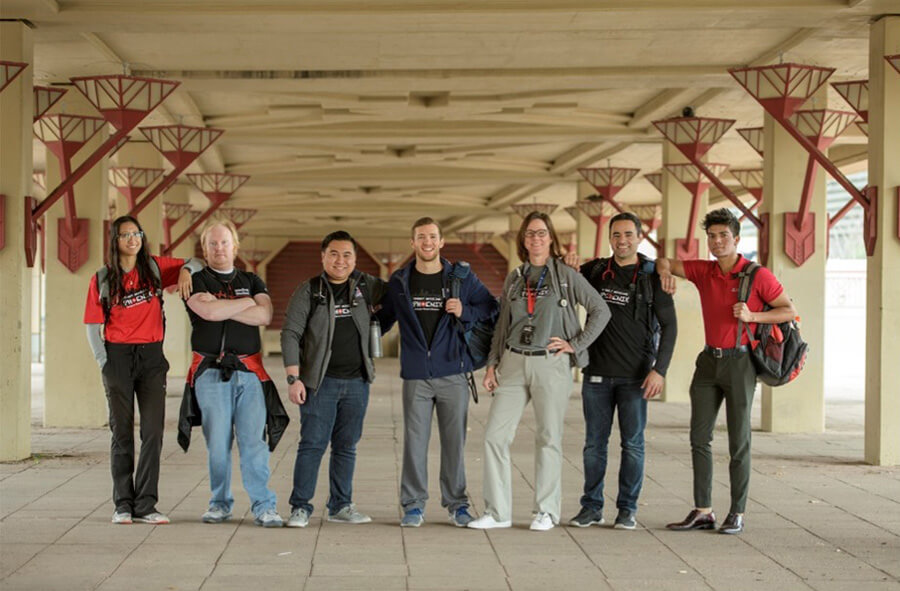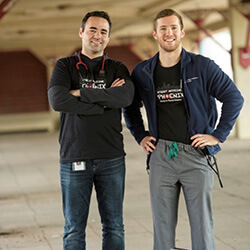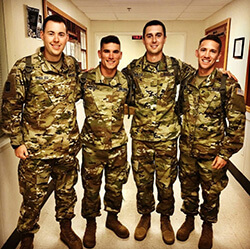
Commencement Profile - Justin Zeien


“I feel very proud and excited about what has been accomplished so far. Medical school graduation is another milestone down; I'm excited for the next part of my journey and residency,” Zeien said.
He was first introduced to medicine as a career in high school when he took a field trip. Zeien watched an open-heart surgery. His attention was focused not on the surgeon, but on another health care provider in the room.
“I was looking at the guy behind the curtain — the anesthesiologist — saying to myself, ‘What is that guy doing? That looks like something that I might be interested in.’ Just the way he was moving with medications and looking at all the vitals and everything,” Zeien said.
Zeien was intrigued by the hands-on nature of anesthesia, plus the critical thinking and leadership skills needed to provide care and monitor patients throughout surgical procedures.
“I started talking with anesthesiologists and shadowing very early in undergrad, and then throughout medical school. Also, the fact that you have such a limited time to really establish rapport with a patient, and then essentially their life is in your hands. It's up to you to make sure that despite what the surgeons are doing on the other side of the curtain, you're there to make them comfortable and make them come out of surgery feeling as great as possible,” Zeien said.
His best advice to future medical students is to pursue projects they are really passionate about. For Zeien, who also has a master’s degree in public health from the University of Arizona, it’s a philosophy he has taken to heart.
Four years ago, he and Jeffrey Hanna, a fellow public health student studying at Northern Arizona University, developed Street Medicine. Street Medicine is modeled after a similar program at Wayne State University and is designed to serve the unmet needs of individuals experiencing homelessness in Phoenix, Arizona.
“As I was applying to medical school, I was constantly thinking about what sort of programs I could implement to serve underserved populations — to really address the health inequities that exist in those populations,” Zeien said.
The organization is led by students and faculty and includes team members from Arizona State University, Northern Arizona University, University of Arizona and Midwestern University. The Street Medicine team has scaled up to over 150 students from the original two founders. They worked shifts around coursework and rotations and even provided COVID-19 vaccinations.
“Initially we thought it would just be medical care, but as we did a needs assessment, we learned more about the population,” Zeien.
When the teams went out into the community, frequently on foot and carrying backpacks with supplies, they learned that, in addition to health care, the people they met also needed food, vision care, cell phones for communication and veterinary services for their pets.
“Our ultimate goal is really just to meet people where they're at. And in a humanistic, dignified way, really restore them to where they want to be in life and help them achieve the goals that they want to achieve; if they want to get healthy, we can do that,” Zeien said.

“I feel Street Medicine Phoenix is in a place where I can leave and comfortably say that it will continue to excel and grow as a program,” Zeien said. “Right now, we have two third-year medical students and a junior at Arizona State University leading the program. They will continue to pull in new young leaders from both the medical school, as well as the other universities who we partner with to continue to power the transmission of leadership.”
Zeien, who matched at Walter Reed National Military Medical Center, will get to apply his skills in anesthesiology with his commitment to serving others. After he completes his residency, he will serve in the U.S. Army for two deployments, totaling four years.
About the College
Founded in 2007, the University of Arizona College of Medicine – Phoenix inspires and trains exemplary physicians, scientists and leaders to advance its core missions in education, research, clinical care and service to communities across Arizona. The college’s strength lies in our collaborations and partnerships with clinical affiliates, community organizations and industry sponsors. With our primary affiliate, Banner Health, we are recognized as the premier academic medical center in Phoenix. As an anchor institution of the Phoenix Bioscience Core, the college is home to signature research programs in neurosciences, cardiopulmonary diseases, immunology, informatics and metabolism. These focus areas uniquely position us to drive biomedical research and bolster economic development in the region.
As an urban institution with strong roots in rural and tribal health, the college has graduated more than 1,000 physicians and matriculates 130 students each year. Greater than 60% of matriculating students are from Arizona and many continue training at our GME sponsored residency programs, ultimately pursuing local academic and community-based opportunities. While our traditional four-year program continues to thrive, we will launch our recently approved accelerated three-year medical student curriculum with exclusive focus on primary care. This program is designed to further enhance workforce retention needs across Arizona.
The college has embarked on our strategic plan for 2025 to 2030. Learn more.